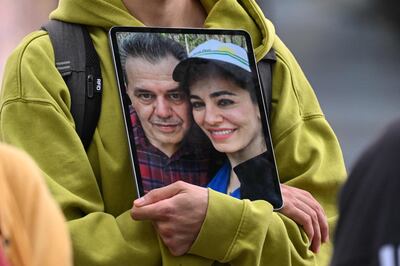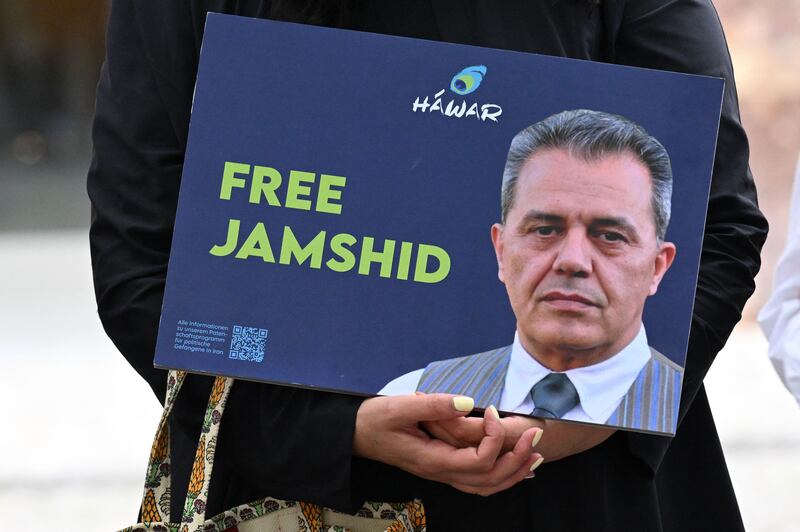Jamshid Sharmahd's family have been through three years of torment as each day they await a breakthrough in the case of the German citizen sentenced to death in Iran.
About 20 people gathered outside the Foreign Ministry in Berlin on Monday to mark three years since Iran announced Mr Sharmahd's capture, AFP reported.
The demonstrators held signs saying "Free Jamshid" and "Stop executions".
"There is no pressure. A German citizen was kidnapped and nothing happened," his daughter Gazelle Sharmahd, who lives in the US, told AFP.
"It's a game – they push and you push. The push for them is to hang my dad."
Iranian authorities abducted Mr Sharmahd in July 2020 and the country's Supreme Court this year sentenced him to be hanged for "corruption on earth".
More than a dozen foreign passport holders are being held by Iran as hostages in a bid to extract concessions from the West, activists say.
His family says that Tehran-born Mr Sharmahd, 68, a software developer who immigrated to Germany in the 1980s but then moved to live in the US, was kidnapped by Iranian security services.
Iran has never confirmed how he was detained, saying only he was seized in a "complex operation".

Amnesty International has said he was subjected to "enforced disappearance" followed by a "sham trial" and torture in detention.
The UN Working Group on Arbitrary Detention has classified Mr Sharmahd's detention as arbitrary and confirmed the family's details on his abduction.
His family, who say he only holds a German passport, are urging stronger action from the German and other western governments to earn his release.
Berlin expelled two Iranian diplomats in response to the death sentence, which it called "unacceptable".
Mr Sharmahd earlier in July was allowed to call his wife, who is also in the US, for the first time in five months.
He was also permitted to speak to Gazelle for first time in two years.
But his daughter said the one-hour conversation, in which he sounded tired, raised more questions than answers.
"Phone calls are great but also a reason for concern," Ms Sharmahd said.
"They always have a purpose. It could be either a window of opportunity to save his life or a goodbye call.
"Was this to make us shut up before they execute him? Was this a goodbye?"
The Mizan Online news agency of Iran's judiciary reported in February that a Tehran court sentenced Mr Sharmahd "on the charge of corruption on earth through planning and directing terrorist acts", including a 2008 bombing in Shiraz that killed 14 people.
His family ridicule these accusations, saying a "long series of baseless charges" were laid against him in addition to the mosque bombing.
In Berlin, a German Foreign Ministry spokesman told AFP that the government was using "all channels" to ensure Mr Sharmahd was not executed, while acknowledging his family was "going through something unimaginable and unbearable".
Concern over the risk to his life has intensified since Iran in May executed the Iranian-Swedish dissident Habib Chaab.
He was also convicted of "corruption on earth". Mizan said Chaab led the "Harakat al-Nidal terrorist group" which Iran blames for attacks in Khuzestan province.
According to Amnesty, Chaab was abducted in Turkey in October 2020 to face trial in Iran.
Another Iranian-Swedish citizen, academic Ahmadreza Djalali, is also at risk of being hanged after a conviction for "corruption on earth".
He was sentenced to death in 2017 based on accusations of spying for Israel, which his family vehemently rejects.
Gazelle Sharmahd said she was thrilled for the family of Belgian aid worker Olivier Vandecasteele, who was freed by Iran in a deal in which Asadollah Assadi, an Iranian diplomat convicted on terrorism charges over a plot to bomb an opposition meeting outside Paris, was released.
Two Austrians and a Dane were days later freed by Iran in a related move under a deal Oman helped to broker.
But Gazelle Sharmahd said the release of the four men in apparent exchange for Assadi had also left a bitter taste.
"It should have been everybody," she said, denouncing a lack of Europe-wide co-ordination.
"How inhuman is it to leave people behind who have a death sentence? Belgium played the biggest card that Europe had."







